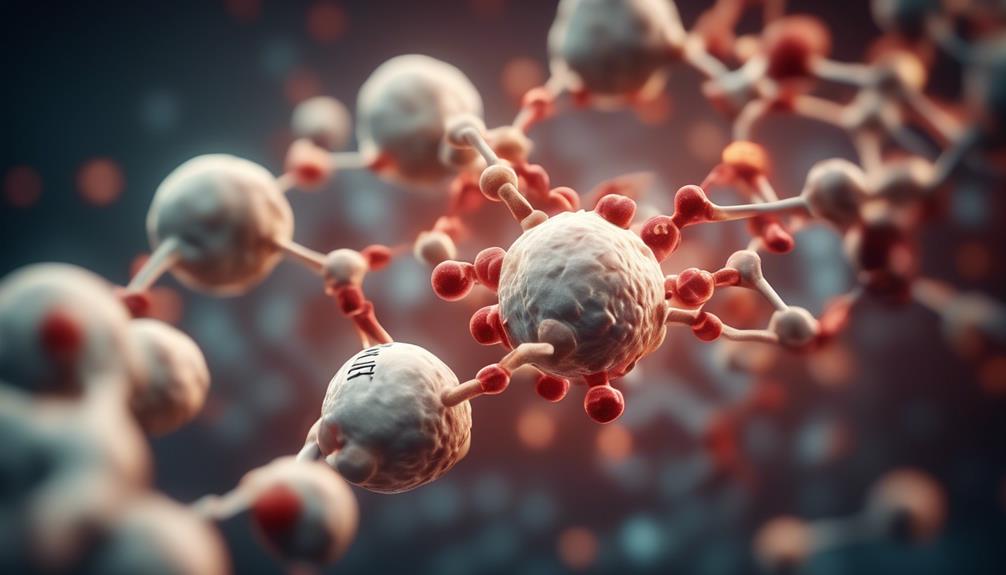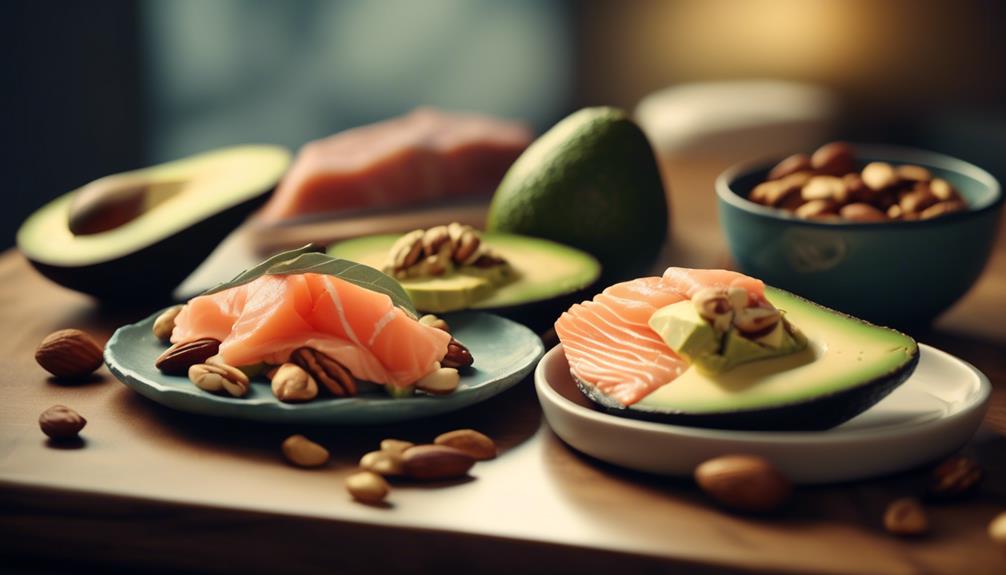Are you tired of battling with high cholesterol levels? Well, it's time to let the keto diet be your knight in shining armor. While it may seem like just another trendy diet, the keto diet has actually been shown to have cholesterol-reducing benefits.
But how exactly does it work? In this discussion, we will uncover the link between keto and cholesterol, explore how a keto diet affects LDL and HDL cholesterol, and delve into the impact on triglyceride levels.
So, put on your armor, because we're about to embark on a cholesterol-lowering adventure with the keto diet.
Understanding Cholesterol: The Basics

To understand cholesterol and its role in your health, it's important to start with the basics. Cholesterol is a waxy substance found in your blood. It's produced by your liver and also obtained through dietary factors. Cholesterol is essential for the production of hormones, vitamin D, and the building of cell membranes. However, high levels of cholesterol can lead to serious health problems, such as heart disease.
Dietary factors play a significant role in cholesterol levels. Foods high in saturated and trans fats can increase your cholesterol levels, while foods high in soluble fiber can help lower it. It's important to include a variety of fruits, vegetables, whole grains, and lean proteins in your diet to maintain healthy cholesterol levels.
In addition to dietary changes, cholesterol lowering medications can be prescribed by your healthcare provider. These medications, such as statins, work by reducing the production of cholesterol in the liver. They can be effective in lowering cholesterol levels, especially when combined with lifestyle changes.
Understanding cholesterol and its impact on your health is crucial for making informed decisions about your diet and lifestyle. By incorporating dietary factors and, if necessary, cholesterol lowering medications, you can maintain healthy cholesterol levels and reduce the risk of heart disease.
The Link Between Keto and Cholesterol
High levels of cholesterol can have serious health implications, so it's important to understand how certain diets, such as the keto diet, may impact cholesterol levels. The link between the keto diet and cholesterol is a topic of ongoing research and debate.
Some studies suggest that the keto diet may help reduce levels of total cholesterol, LDL (bad) cholesterol, and triglycerides, while increasing levels of HDL (good) cholesterol.
One reason for these potential cholesterol-lowering effects is the low carbohydrate intake associated with the keto diet. When you consume fewer carbohydrates, your liver produces fewer triglycerides, which are a type of fat that can raise cholesterol levels. Additionally, the keto diet promotes weight loss, and losing weight can also lead to improvements in cholesterol levels.
However, it's important to note that not all studies have found a positive link between the keto diet and cholesterol. Some research suggests that the diet may increase levels of LDL cholesterol in some individuals. It's also worth mentioning that the impact of the keto diet on cholesterol levels may vary depending on individual factors such as genetics, overall diet quality, and adherence to the diet.
How a Keto Diet Affects LDL Cholesterol

When following a keto diet, you may be curious about its impact on your LDL cholesterol levels and how it relates to your cardiovascular health. LDL cholesterol is often referred to as the 'bad' cholesterol because high levels can contribute to the development of heart disease.
Understanding how a keto diet affects LDL cholesterol is important for assessing its overall impact on your health.
LDL Cholesterol Levels
The impact of a keto diet on LDL cholesterol levels can be better understood through evidence-based research and analysis. LDL cholesterol, also known as 'bad' cholesterol, is a key factor in the development of cardiovascular diseases.
Many individuals are concerned about the potential increase in LDL cholesterol that can occur when following a high-fat diet like keto. However, studies have shown that a well-formulated keto diet can actually lead to improvements in LDL cholesterol management.
One study published in the Journal of Clinical Lipidology found that individuals following a keto diet experienced a significant decrease in LDL cholesterol levels compared to those on a low-fat diet. This suggests that a keto diet can be an effective strategy for cholesterol lowering.
However, it's important to note that individual responses may vary, and it's always recommended to consult with a healthcare professional before making any dietary changes for cholesterol management.
Impact on Cardiovascular Health
A well-formulated keto diet has been shown to have a positive impact on cardiovascular health by affecting LDL cholesterol levels. Here are some key points to consider regarding the cardiovascular benefits and cholesterol management of a keto diet:
- Decreased LDL cholesterol: Research suggests that a keto diet can lead to a reduction in LDL cholesterol levels, which is often referred to as 'bad' cholesterol. This is beneficial for cardiovascular health as high levels of LDL cholesterol are associated with an increased risk of heart disease.
- Increased HDL cholesterol: A keto diet has been found to increase levels of HDL cholesterol, often referred to as 'good' cholesterol. HDL cholesterol helps remove LDL cholesterol from the bloodstream, reducing the risk of plaque buildup in the arteries.
- Improved triglyceride levels: Triglycerides are another type of fat found in the blood. A keto diet has been shown to lower triglyceride levels, which is beneficial for cardiovascular health.
- Reduced inflammation: Chronic inflammation is linked to various cardiovascular diseases. Studies have shown that a keto diet can help reduce inflammation markers in the body, potentially improving cardiovascular health.
Impact of a Keto Diet on HDL Cholesterol
When it comes to the impact of a keto diet on HDL cholesterol, there are several important points to consider.
First, research suggests that following a keto diet may lead to improved levels of HDL cholesterol, often referred to as the 'good' cholesterol.
This is because the diet promotes weight loss and reduces triglyceride levels, both of which can contribute to higher HDL levels.
HDL Cholesterol and Keto
Optimize your cholesterol levels with a keto diet, as it has been shown to positively impact HDL cholesterol. Here are some key points to consider:
- Increased HDL levels: The keto diet has been found to increase the levels of high-density lipoprotein (HDL) cholesterol, which is often referred to as 'good' cholesterol. HDL cholesterol helps to remove low-density lipoprotein (LDL) cholesterol from the bloodstream, reducing the risk of heart disease.
- Improved cholesterol profile: Following a keto diet can lead to a favorable cholesterol profile by increasing HDL cholesterol and reducing levels of triglycerides and LDL cholesterol. This combination is associated with a lower risk of cardiovascular disease.
- Weight loss benefits: The keto diet can promote weight loss, and shedding excess weight can have a positive impact on cholesterol levels. Losing weight through the keto diet may increase HDL cholesterol and lower LDL cholesterol.
- Individual variation: It's important to note that the effects of the keto diet on HDL cholesterol may vary among individuals. Factors such as genetics, lifestyle, and overall diet quality can influence the response.
Improved HDL Levels
By following a keto diet, you can further enhance the positive impact on your cholesterol levels, specifically by improving your HDL cholesterol. HDL cholesterol, commonly known as the 'good' cholesterol, plays a crucial role in maintaining cardiovascular health. Studies have shown that a keto diet can lead to increased levels of HDL cholesterol, which can contribute to improved cardiovascular health.
One of the ways a keto diet improves HDL levels is by reducing triglyceride levels. Triglycerides are a type of fat found in your blood that, when elevated, can increase your risk of heart disease. By restricting carbohydrates and increasing fat intake, the keto diet helps to lower triglyceride levels, leading to improved HDL cholesterol levels.
In addition to lowering triglyceride levels, the keto diet also promotes weight loss, which further contributes to the improvement of HDL cholesterol levels. Excess weight, especially around the waist, is associated with lower HDL levels. By shedding excess pounds, the keto diet helps to increase HDL cholesterol, ultimately improving cardiovascular health.
It is important to note that while a keto diet can improve HDL cholesterol levels, it's essential to maintain a balanced and varied diet to ensure overall nutritional adequacy. Consult with a healthcare professional before making any significant dietary changes to ensure that it aligns with your individual needs and goals.
Keto's Impact on HDL
The impact of a keto diet on HDL cholesterol levels is significant and can lead to notable improvements in cardiovascular health. Here's how a keto diet affects HDL cholesterol:
- Increased HDL levels: Research has shown that following a keto diet can increase levels of high-density lipoprotein (HDL) cholesterol, commonly known as 'good' cholesterol. HDL cholesterol helps remove low-density lipoprotein (LDL) cholesterol, also known as 'bad' cholesterol, from the bloodstream.
- Enhanced cardiovascular health: Higher levels of HDL cholesterol are associated with a reduced risk of heart disease and improved cardiovascular health. HDL cholesterol helps remove excess cholesterol from artery walls, preventing the formation of plaques that can lead to blockages and heart attacks.
- Triglyceride reduction: A keto diet typically reduces triglyceride levels, which is another risk factor for heart disease. Lower triglyceride levels combined with increased HDL cholesterol contribute to better overall cardiovascular health.
- Balanced lipid profile: By increasing HDL cholesterol levels and reducing triglycerides, a keto diet can help achieve a more balanced lipid profile, which is essential for maintaining heart health.
Exploring Triglyceride Levels on a Keto Diet
How does a keto diet impact triglyceride levels in the body?
Triglycerides are a type of fat found in your blood. High levels of triglycerides can increase your risk of heart disease. Research has shown that following a ketogenic diet, which is high in fat and low in carbohydrates, may help lower triglyceride levels.
When you consume a ketogenic diet, your body enters a state of ketosis. During ketosis, your body primarily uses fat for fuel instead of carbohydrates. This leads to a reduction in circulating triglycerides as your body breaks down stored fats for energy.
Several studies have shown the positive effects of a ketogenic diet on triglyceride levels. One study published in the Journal of Clinical Lipidology found that individuals following a ketogenic diet experienced a significant decrease in triglyceride levels after 12 weeks. Another study published in the Journal of Nutrition and Metabolism reported similar findings, with participants on a ketogenic diet experiencing a decrease in triglyceride levels compared to those on a low-fat diet.
It is important to note that the impact of a ketogenic diet on triglyceride levels may vary among individuals. Factors such as genetics, overall diet quality, and adherence to the diet plan can influence its effectiveness. It's always recommended to consult with a healthcare professional before making any significant changes to your diet.
Key Considerations for a Cholesterol-Reducing Keto Diet

When considering a cholesterol-reducing keto diet, it's important to take certain factors into account based on the impact a ketogenic diet has on triglyceride levels. Here are key considerations to keep in mind when aiming to lower cholesterol levels on a keto diet:
- Choose healthy fats: While a keto diet typically emphasizes high-fat foods, it's crucial to opt for healthy sources of fat such as avocados, nuts, and olive oil. These fats contain monounsaturated and polyunsaturated fats that can help improve cholesterol levels.
- Include fiber-rich foods: Incorporating fiber-rich foods like vegetables, fruits, and whole grains can help lower LDL cholesterol levels. These foods provide essential nutrients and contribute to a balanced diet while supporting heart health.
- Monitor protein intake: While protein is an important component of a keto diet, excessive consumption of animal-based protein sources may contribute to an increase in LDL cholesterol levels. Opt for lean protein options like poultry, fish, and plant-based proteins to maintain a healthy balance.
- Stay hydrated: Drinking an adequate amount of water is essential for overall health, including maintaining healthy cholesterol levels. Staying hydrated helps support the elimination of waste products, including cholesterol, from the body.
Conclusion
In conclusion, a keto diet has been shown to have positive effects on cholesterol levels. Research suggests that a keto diet can lead to a decrease in LDL cholesterol, commonly known as 'bad' cholesterol, while increasing HDL cholesterol, or 'good' cholesterol. Additionally, triglyceride levels tend to decrease on a keto diet.
These findings indicate that a cholesterol-reducing keto diet can be a viable option for those looking to improve their lipid profile and overall heart health. Interestingly, a study found that individuals on a keto diet experienced a 29% reduction in LDL cholesterol levels.







